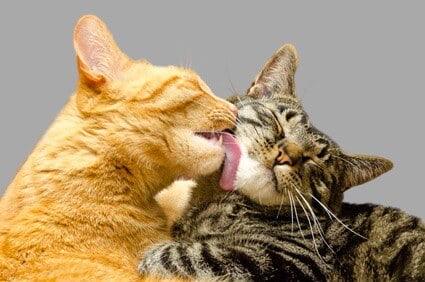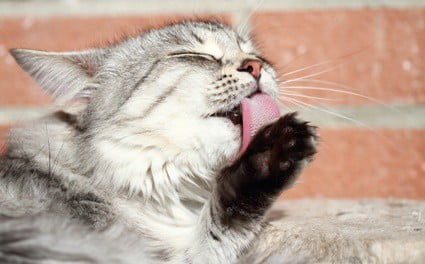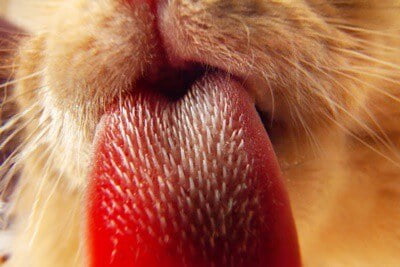Cats have an instinctive urge to lick their cuts because it has a soothing effect. Yet, the main reason cats lick their open wounds is because saliva can help to speed up the healing process.
Cats’ saliva has antiseptic, antibacterial, and healing properties. However, cats’ tongues are covered in harmful bacteria. If your cat licks its wound and leaves it alone, the saliva will have a healing effect. But if it keeps licking the wound, this could result in a bacterial infection.
A cat’s saliva can assist with the healing of flesh wounds. However, it shouldn’t clean or sterilize a human’s cuts, grazes, or abrasions in any circumstances as a cat’s mouth isn’t sterile.
Are Cats’ Tongues Antibacterial?
The saliva of a cat contains some harmful bacteria. However, it also has antibacterial properties. This is why feline salvia has a reputation as a natural antibacterial agent. Cats’ saliva contains the following components:
| Lactoferrin: | An antioxidant protein with antibacterial and antifungal properties, found in the tears and saliva of many animals |
| Defensins and Cystatins: | Peptides in feline saliva that boast antibacterial properties |
| Lysozyme and Peroxidase: | Enzymes that break down harmful bacteria in the cell wall |
| Nitrate compounds: | Break down nitric oxides in the skin, preventing bacterial growth |
In theory, the tongue of a cat has antibacterial properties. It would be too simplistic to state that a cat’s tongue is completely antibacterial, though. Feline saliva is as harmful as it is beneficial.
Healing Properties in Cat Saliva
Before discussing the risks inherent in feline saliva, the healing properties also need to be discussed. It also has some other healing properties, including:
- Opiorphin – a natural form of pain relief
- Epidermal Growth Factors – promotes healing
- Thrombospondin – an antiviral agent
Given the antibacterial, antiviral, and healing properties of saliva, it’s no surprise that many animals feel compelled to lick their wounds. Cats cannot take aspirin for pain, for example, as this toxic. Saliva provides a similar relief from everyday aches and pains.
If a cat briefly licks its wound, the antibacterial and healing properties in the saliva may be beneficial. The barbs on the cat’s tongue will also dislodge any dirt and debris from the wound quickly. Alas, saliva is not the perfect antidote for wound healing.

Are Cats Tongues Clean?
Although cat saliva has antibacterial and wound-healing properties, it is a stretch to say that cats’ tongues are clean. Cats explore the world with their mouths, so a cat’s tongue is host to a range of bacteria, both good and bad.
It’s misleading to claim that saliva from a cat is clean and sterile. Eventually, excessive licking of wounds will drive harmful bacteria into a cat’s bloodstream. If a cat starts to overgroom a wound, this can lead to infection.
Abscesses (deep skin infections) are a common disease in cats. An abscess occurs when bacteria, likely originating in the saliva, enter the wound and cause a painful infection. Even if the outcome is not this severe, it can be problematic.
Harmful Bacteria in Cat Saliva
According to the Journal of Feline Medicine and Surgery, cat saliva can contain the following harmful bacteria:
- Pasteurella multocida – this is part of the normal oral flora of cats. So, even if your cat lives indoors and is very clean, its saliva will still contain Pasteurella multocida
- Staphylococcus intermedius – one of the leading causes of lick granuloma (a form of dermatitis) in cats
- Bartonella henselae – this bacterium often originates in fleas and can be passed between cats and humans
Cats that live in groups, and cats who spend time outdoors, are more likely to have harmful bacteria on their tongues. Also, cats who hunt outdoors are more likely to have a multitude of dangerous bacteria inside their mouths. Rodents, in particular, harbor all manner of disease.
This can have serious repercussions for cats and humans alike. While it can be charming when a cat kisses you, approach this sign of affection with caution. Allowing cats’ saliva to enter your mouth or bloodstream can have negative repercussions.
You can counter these concerns by ensuring that your cat’s mouth is clean. Regular tooth cleaning should be part of your pet care regime. All the same, cats’ tongues can get dirty in the blink of an eye. It’s almost impossible to retain a permanent absence of bacteria.
Illnesses Linked to Cat Saliva
The bacteria found in cat saliva have been linked to numerous serious health concerns. The most notable are:
- Cryptosporidiosis – an intestinal disease that causes serious stomach upsets
- Giardiasis – another intestinal concern that causes painful cramps, as well as diarrhea
- Salmonella poisoning – arguably the most unpleasant gastric complaint of them all
- Toxoplasmosis – a parasitic infection that can result in blindness
- Cat scratch disease (CSD) – swelling and muscle pain caused by Bartonella henselae
These issues are zoonotic, so they will not only affect cats. Other pets, and even humans, can be impacted by feline saliva. Never allow a cat to lick an open wound in the hope of receiving a medicinal benefit.
Why Do Cats Lick Their Wounds?
Many animals clean their wounds using their tongues. This is an instinctive pattern of behavior that can be difficult to prevent. Cats lick their wounds for the following reasons:
- Cleanliness – The barbs on a cat’s tongue remove dirt from a wound. This helps prevent bacterial infection.
- Safety – Washing the wound removes the smell of predators, promoting a sense of safety and security.
- Self-soothing – Licking and grooming promote relaxation in cats.
- Pain relief – Some components of cat saliva provide pain relief.
- Recovery – Saliva does have some antibacterial and healing properties. This is why many animals have a natural urge to lick their wounds.
Although there are benefits to wound cleaning, compulsively cleaning wounds can be detrimental. Unfortunately, the excessive cleaning of wounds is common. This is a behavior that an owner must monitor carefully.
In addition to bacteria, cats’ tongues may contain traces of toxins, grit, or dirt. You never know where your cat has been or what it’s had in its mouth. Always err on the side of caution.
This applies to a wounded cat or another pet in the home. Cats sometimes groom each other to boost comfort following a negative experience. Just ensure these good intentions do not result in long-term health issues.

Do Cats Tongues Heal Wounds?
A cat licking its cuts and scrapes is both good and bad. Cats’ saliva can help it to recover because it has some antibacterial and healing properties.
The act of licking can be self-soothing and pain-relieving. It’s perfectly normal for cats to lick their wounds to remove dirt, so this behavior isn’t usually a cause for concern when done in moderation. Unfortunately, excessive grooming can become a problem for some felines.
It must be remembered that cats’ saliva cannot fight all types of infection. Indeed, deep skin infections are common in cats. This suggests that wound licking is not enough to keep germs away or bacterial infections at bay.
As discussed, feline saliva also contains a range of harmful bacteria. In an open wound, this will spread faster than any positive counterpart. Any effort you make to wash an open wound with antibacterial soap will be negated.
A vet should treat deeper wounds, and the cat prevented from licking the area. Stitches will likely be required. As the purpose of stitches is to keep bacteria out of an open wound, it is counter-productive to invite self-grooming.
Should I Let My Cat Lick its Wounds?
A small amount of licking is fine. This will help your cat soothe any discomfort caused by an injury. Just do not let the cat lick to excess. Anything more than a few seconds is counterproductive.
This is why cats are fitted with Elizabethan collars following surgery. The licking of wounds can become addictive for felines. If stitches burst due to excessive licking, the process becomes harmful.
Purring is a more effective method of healing than licking. As per the Journal of the Acoustical Society of America, the vibrations caused by purring promote bone healing. This action should be promoted above the licking of wounds.
The feline tongue does have antiseptic properties. Unfortunately, these are countered by dangerous bacteria. This means that feline saliva shouldn’t be seen as a cure-all. It can certainly never be considered a substitute for medication or treatment from a veterinarian.

